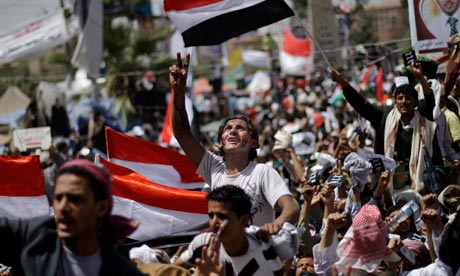- guardian.co.uk,

Yemen's president, Ali Abdullah Saleh, has signalled he has no plans to step down as huge rival demonstrations swept through the capital, Sana'a.
Saleh's display of defiance, in which he said he would sacrifice everything for his country, followed weeks of youth-led anti-government protests, as well as a string of defections by generals last week that analysts say had him on the brink of resignation. But on Friday Saleh appeared newly emboldened, telling supporters he would "guard their country" and they had "nothing to fear".
"Rule in Yemen cannot be changed by force. Yemen is a democratic nation and means for change are available through elections only," Saleh told a crowd of half a million government loyalists, many of them tribesmen from the surrounding countryside, assembled outside the president's mosque.
"I pledge to sacrifice my blood and everything I hold valuable for the sake of my great people," he said, to massive applause from the men who waved guns and jambiyas – Yemeni daggers – in the air as a soviet-era government helicopter swept over the crowd.
Chants of "People want Ali Abdullah Saleh" and "With our soul and blood, we support you, Saleh," rang out from the crowds.
Sana'a remains a tense and divided capital. Two miles north of the mosque, anti-government protesters at Sana'a University were staging their biggest pro-democracy rally since unrest broke out five weeks ago in what they called the Friday of frustration.
"This regime must understand that our protests will continue to be peaceful and we will not be tricked to use force," Mohammed Qahtan, an opposition spokesman, told the young protesters. They filled a two-mile stretch of road with tents, banners and makeshift restaurants under the watchful eyes of soldiers and tanks sent by the defected general, Ali Mohsin, to protect them.
Security forces had to point their guns at a mob of pro-government supporters wielding iron crowbars, to prevent them from marching towards the university. The group backed off but smashed the windows of a nearby house they claimed was owned by prominent opposition figure Hamid Al-Ahmar.
The city is now roughly divided into a northern half held by the opposition camp and Saleh's supporters packing the southern sector.
Western nations fear further turmoil in an impoverished nation already facing an intermittent rebel war in the north and a secessionist movement in the south, and which is an active al-Qaida affiliate. Saleh has held such a tight grip on power that there is no obvious replacement.
Saleh has reeled off concessions, including an offer last Tuesday to hold elections and step down by the end of 2011. But they have been snubbed by a dogged opposition coalition maintaining it will accept nothing short of his immediate resignation.
Meanwhile, the central government continues to lose control of territory. There are reports of local officials deserting their posts or of being driven out, especially in al Jawf, Sa'ada, and a few of the southern governorates. Yemen's military is now divided between defectors and loyalists, with troops staking out strategic positions in Sana'a.
No comments:
Post a Comment